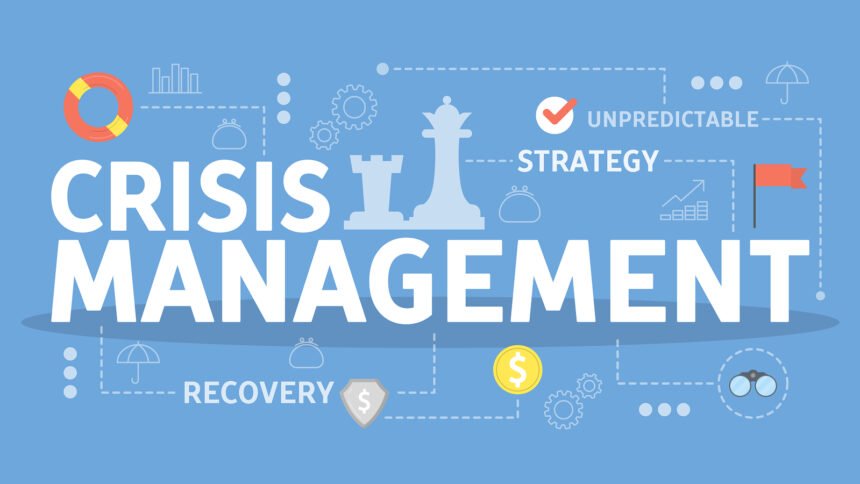In today’s unpredictable global economy, the ability to manage a financial crisis has become more crucial than ever. Financial crises, whether they stem from sudden market crashes, natural disasters, or internal corporate mismanagement, can leave businesses and individuals reeling. In the United States, where the economy is deeply interconnected with global markets, understanding the intricacies of financial crisis management is a key to survival. This blog delves into the strategies, tools, and practices essential for effective financial crisis management, providing both businesses and individuals with practical solutions to safeguard their financial well-being.
What is Financial Crisis Management?
Financial crisis management refers to the process of identifying, assessing, and responding to financial disruptions that threaten the economic stability of an entity. This could range from a sudden liquidity crisis, where a business or individual cannot meet its short-term financial obligations, to more severe cases, such as bankruptcy or national recessions. The ability to manage a crisis often involves quick decision-making, risk mitigation, and the timely implementation of a recovery strategy.
Understanding the Importance of Financial Crisis Management
For businesses, financial crisis management is not merely about surviving; it is about positioning oneself to recover and even thrive once the crisis subsides. During times of economic uncertainty, companies must be agile, make informed decisions, and stay ahead of potential financial pitfalls. This applies to individuals as well. Personal financial crisis management could involve everything from cutting costs and budgeting to seeking professional financial advice.
Effective management of financial crises requires careful analysis, a strategic plan, and the ability to act decisively under pressure. As Albert Einstein once said, “In the middle of difficulty lies opportunity.” This mindset, which focuses on resilience, is critical in navigating through any financial storm.
The Key Components of Financial Crisis Management
Financial crises often create a complex web of challenges. To address them, organizations and individuals need a solid management framework. Below, we will explore the essential components of an effective financial crisis management strategy.
1. Risk Identification and Early Warning Systems
The first step in financial crisis management is recognizing the signs of a potential crisis before it escalates. Risk identification involves continuously monitoring economic conditions, market trends, and internal financial health. Early warning systems—whether automated financial models or expert judgment—help businesses and individuals stay prepared. By recognizing the early signs, such as falling revenues or unexpected spikes in debt, a company can take preventive action before the situation becomes dire.
A proactive approach can involve reviewing key financial indicators like liquidity ratios, solvency ratios, and operating margins. Understanding these metrics helps in recognizing problems that might lead to a financial crisis.
2. Developing a Crisis Management Plan
Once a crisis is identified, the next step is to develop a clear, actionable plan. This involves outlining how to respond to the crisis, identifying key personnel responsible for managing the situation, and determining what resources will be required. A comprehensive crisis management plan ensures that every stakeholder knows their role and the actions required.
This plan should focus on cost-cutting measures, debt restructuring, and prioritizing critical operations. In times of financial crises, companies may need to make tough decisions, such as layoffs, mergers, or seeking outside funding sources. Therefore, it’s important to be both strategic and compassionate when delivering difficult news to employees or customers.
3. Effective Communication
During a financial crisis, communication becomes a crucial factor in maintaining stakeholder confidence. Whether addressing employees, investors, or the general public, clarity and transparency are vital. Inadequate or unclear communication can exacerbate the crisis, leading to a loss of trust and further damage to the brand.
Effective communication should involve explaining the nature of the crisis, outlining the immediate steps being taken, and providing reassurance that the organization has a recovery plan in place. By keeping lines of communication open, companies can avoid unnecessary panic and build trust with their stakeholders.
4. Financial Re-Engineering and Cost-Cutting
One of the most immediate and impactful actions taken during a financial crisis is re-engineering the financial structure of the business. This may include renegotiating loans, restructuring debts, or reducing operational costs to free up cash flow. Often, this step involves a thorough review of the organization’s budget to eliminate unnecessary expenditures, streamline operations, and focus resources on core activities that drive revenue.
For individuals, this could mean cutting back on discretionary spending, refinancing debts, or seeking additional sources of income to maintain financial stability.
5. Implementing Recovery Strategies
After addressing the immediate financial challenges, the next phase of crisis management is recovery. A well-structured recovery strategy involves restoring financial health through new business strategies, capital infusion, or market repositioning. For businesses, recovery can involve launching new products, entering new markets, or adjusting pricing strategies. A strong recovery strategy requires careful analysis of market opportunities and a long-term vision.
For individuals, financial recovery may include rebuilding credit, increasing savings, or investing in more stable financial assets. By focusing on future growth while addressing past financial issues, recovery can set the stage for long-term financial resilience.
The Role of Leadership in Financial Crisis Management
Leadership is the backbone of any effective financial crisis management strategy. In times of uncertainty, employees, stakeholders, and clients look to leaders for guidance and direction. A leader must be able to make tough decisions while maintaining composure and inspiring confidence. Strong leadership ensures that an organization can navigate through a financial storm and emerge stronger.
According to renowned financial expert Warren Buffett, “It’s only when the tide goes out that you learn who’s been swimming naked.” This statement underscores the importance of leadership during times of crisis. Leaders must not only manage financial resources but also provide clear direction and motivation for those affected by the crisis.
Expert Insights: Financial Crisis Management from Leading Professionals
In a conversation with Dr. Janet L. Yellen, former Chair of the Federal Reserve, she noted: “The key to managing a financial crisis is quick, decisive action, but also maintaining a calm and level-headed approach.” Dr. Yellen’s insight underscores the balance between urgency and composure that financial leaders must strike when facing a crisis. A fast response combined with thoughtful decision-making ensures the long-term health of the organization.
Preparing for the Next Financial Crisis
While it is impossible to predict when a financial crisis will occur, businesses and individuals can take steps to be better prepared. One important strategy is to diversify financial assets to spread risk. Businesses should build robust contingency plans and establish emergency funds to manage unexpected challenges.
Moreover, staying updated on market trends and financial technologies can provide a competitive edge in predicting potential disruptions. Regularly reviewing and adjusting financial plans, as well as continually educating oneself about financial strategies, are crucial to being prepared for future crises.
Conclusion: Resilience in Financial Crisis Management
Managing a financial crisis is about more than just surviving; it’s about thriving in the face of adversity. By recognizing the early signs of financial distress, developing a comprehensive crisis management plan, communicating effectively, and implementing recovery strategies, businesses and individuals can weather financial storms. Leadership plays a critical role in guiding organizations and individuals through the difficult periods that crises inevitably bring.
In a world where economic uncertainty is a constant, building resilience through financial crisis management is a crucial skill. With the right preparation and strategy, any financial crisis can be transformed into an opportunity for growth and long-term success.
By adopting a proactive mindset and utilizing the tools available, individuals and businesses alike can face the next crisis with confidence and resilience.





